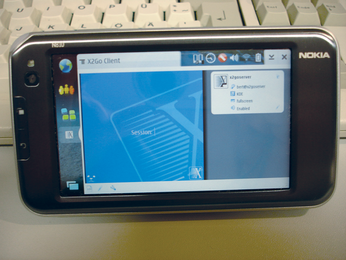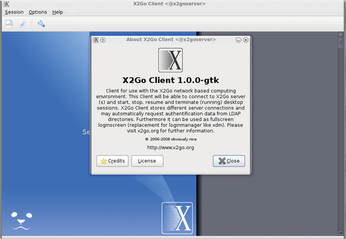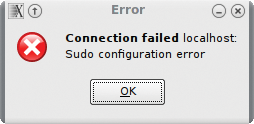Server-based computing with the free X2Go terminal server
Completely Open Source
X2Go is not compatible with LTSP or NX, but goes its own way. The project wants to avoid the need to integrate applications for file or media shares in the server and client; thus, it relies on solutions such as FUSE and SSHFS, which are both maintained by other parties. All the components are open source, and the full source code is available for download from the project's homepage.
The three X2Go clients differ only slightly with respect to functionality, although they rely on different libraries. The Qt 4 client in Figure 3 runs on Linux, Windows, Mac OS X, and Maemo, and – just like its new Gtk counterpart (Figure 4) – either as a full-screen display manager in the style of XDM or as a standalone application. In both cases, administrators either can allow individual configurations or tell X2Go to use a central LDAP server.
 Figure 3: X2Go recently released a terminal client for the Maemo platform used by the Nokia N770/800 and N810 smartphones.
Figure 3: X2Go recently released a terminal client for the Maemo platform used by the Nokia N770/800 and N810 smartphones.
 Figure 4: The recently released Gtk client looks very similar to the Qt version but will run on Gnome.
Figure 4: The recently released Gtk client looks very similar to the Qt version but will run on Gnome.
All graphical clients follow the same usability concept (see Figures 2--4). The widget set used here was dubbed Cardview and uses a business card-style approach.
Sessions, users, and configurations are configurable via drop-down lists and pop-ups in this view, without the need to switch to an admin tool. However, if an LDAP server is used to manage user and configuration data, a client-side configuration is not needed; the tool simply shows a list of users allowed to log on from the current system.
Windows and CLI
The X2Go client can be configured via a simple desktop program that is reminiscent of a physical terminal server client. Again access to a central LDAP directory is possible, and on top of this, users can access other servers and resize and hide the window during use. The third option is a flexible command-line client, x2goclient-cli, which is best suited for launching from other programs.
In contrast, the new Gtk client is designed for Gnome and Linux users who want to avoid Qt-based programs and KDE. It was implemented natively and does completely without Qt dependencies. Officially, this client was still under development when this issue went to press, although no bugs are currently known.
SSHFS, NX, and Local Media
Client programs are not restricted to connecting to the graphical display on the X2Go server but can also connect the local filesystem with the server and redirect the server's sound output to the client machine.
The SSH port 22 and the X2Go tunnel are all it takes to access the server. But in contrast to NoMachine, the project uses SSHFS for file transfers, relying on the packages maintained by the distribution for this.
X2Go uses Udev to support local mass storage devices, such as CD-ROMs, and automatically connects them to the server. For computers that do not have a hardware key to eject media, the desktop displays an icon that forwards the commands to the client; this feature is important for Mac clients.
While a session is running, users can share additional directories (Figure 5). X2Go automatically adds them to the desktop like statically configured filesystem shares and adds entries for unmounting to the drop-down menu.
 Figure 5: If the user is not a member of the X2Go group, the client will issue a message concerning the (incorrect) configuration of the sudo system.
Figure 5: If the user is not a member of the X2Go group, the client will issue a message concerning the (incorrect) configuration of the sudo system.
Besides simple username and password-based logins, X2Go also supports Sun-style flexible sessions to go, including smartcard or USB stick-based authentication. However, there is no alternative to a crypto filesystem on the USB stick; otherwise, users that gain access to a lost stick could simply read the ID number.
Admins in professional environments will probably want to opt for the security of a smartcard instead, the advantage being that the smartcard calculates the ID rather than storing it.
Cherry keyboards with integrated card readers are a good choice of hardware, as are attractively priced devices by Towitoko, or any other Class 1 card reader (or better) that supports OpenPGP card [12].
« Previous 1 2 3 4 Next »
Buy this article as PDF
(incl. VAT)
Buy Linux Magazine
Subscribe to our Linux Newsletters
Find Linux and Open Source Jobs
Subscribe to our ADMIN Newsletters
Support Our Work
Linux Magazine content is made possible with support from readers like you. Please consider contributing when you’ve found an article to be beneficial.

News
-
OSJH and LPI Release 2024 Open Source Pros Job Survey Results
See what open source professionals look for in a new role.
-
Proton 9.0-1 Released to Improve Gaming with Steam
The latest release of Proton 9 adds several improvements and fixes an issue that has been problematic for Linux users.
-
So Long Neofetch and Thanks for the Info
Today is a day that every Linux user who enjoys bragging about their system(s) will mourn, as Neofetch has come to an end.
-
Ubuntu 24.04 Comes with a “Flaw"
If you're thinking you might want to upgrade from your current Ubuntu release to the latest, there's something you might want to consider before doing so.
-
Canonical Releases Ubuntu 24.04
After a brief pause because of the XZ vulnerability, Ubuntu 24.04 is now available for install.
-
Linux Servers Targeted by Akira Ransomware
A group of bad actors who have already extorted $42 million have their sights set on the Linux platform.
-
TUXEDO Computers Unveils Linux Laptop Featuring AMD Ryzen CPU
This latest release is the first laptop to include the new CPU from Ryzen and Linux preinstalled.
-
XZ Gets the All-Clear
The back door xz vulnerability has been officially reverted for Fedora 40 and versions 38 and 39 were never affected.
-
Canonical Collaborates with Qualcomm on New Venture
This new joint effort is geared toward bringing Ubuntu and Ubuntu Core to Qualcomm-powered devices.
-
Kodi 21.0 Open-Source Entertainment Hub Released
After a year of development, the award-winning Kodi cross-platform, media center software is now available with many new additions and improvements.

